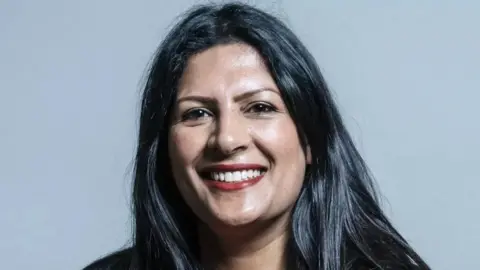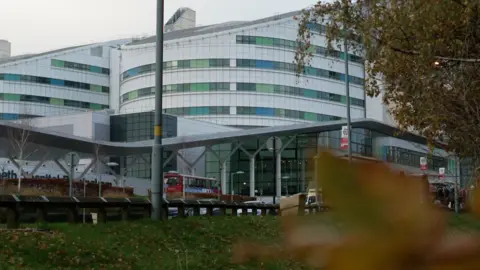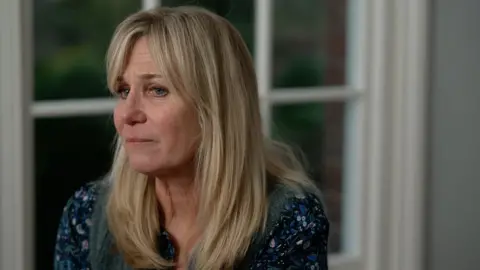Birmingham hospital trust declared war on me - surgeon
John Watkinson was one of the country's top ear, nose and throat surgeons.
He wrote guidelines and ran courses for cancer care. He was invited to work at London's renowned Royal Marsden hospital. If you looked at the front cover of the main surgical textbook for his discipline, you would see his name.
But Mr Watkinson's life and career were turned upside down when he was accused of shortening the lives of three patients, suspended and investigated.
General Medical Council investigators would eventually close his case, taking no further action, and Mr Watkinson would receive an apology for what he had experienced from his employer University Hospitals Birmingham (UHB) NHS Trust.
But that was six years after he was first suspended - six years that would see him pushed to the brink.
"As doctors, we're trained in communication skills, we have appraisals, mandatory training," he says. "But the one thing we're not trained to cope with is when somebody declares war on you."
The hospital trust stands by its decision to suspend Mr Watkinson and says its referral to the General Medical Council was "appropriately made following a clinical colleague raising significant concerns" about patient care.
 UK Parliament
UK ParliamentUHB has been in the spotlight in recent weeks, with reviews launched into its culture, leadership, and allegations of poor patient care aired in a Newsnight investigation late last year. It says a review into patient care is now well under way.
It is one of the biggest hospital trusts in England, treating two million patients a year, and also among the busiest.
But according to one recent assessment, across a whole host of patient outcomes it is also one of the worst performing - 119th out of 120 trusts.
The trust is made up of four hospitals in Birmingham - Heartlands, Good Hope, Queen Elizabeth and Solihull.
'Alarming impact'
Birmingham MP Preet Gill has now written to the health secretary demanding a public inquiry into the culture at the trust.
Since Newsnight's investigation, Ms Gill says she has been "inundated" with messages from UHB staff past and present "to share their experience of what has been repeatedly described as a toxic culture that has had an alarming impact on staff and patient care".
Mr Watkinson says he was at the sharp end of this culture when he was suspended and suddenly went "from hero to zero".
He accepts mistakes were made, but not just by him and not ones that would have affected the patients' outcomes.
"You question life," he says. "You wonder where it's all going.
"When you are going through this, you do suffer with depression and can take antidepressants.
"Alcohol becomes a big factor and suicide raises its ugly head."
Asked why he thought the referral against him was made, Mr Watkinson says he is not sure but "I could have been surplus to requirements".
"I'm not too sure why it happened, but it's certainly... in my impression it wasn't because the standard of care that I provided to my patients was less than would be expected for an ENT surgeon."

Earlier this year, doctors' union the British Medical Association called for an independent review of the GMC referral process, saying investigations should be used "proportionately, appropriately, and only when necessary".
Newsnight has been investigating what some insiders at UHB describe as a culture of fear, where referrals to the GMC, they say, - which can investigate a doctor's fitness to practise - are used to intimidate clinicians.
Nationally, between 2012 and 2020 one in three doctors referred by their employer to the GMC ended up with a sanction or warning.
UHB, Newsnight revealed, has referred 26 doctors to the professional body in the past decade, but no action was taken in any case.
Mr Watkinson was one of those referred.
An internal UHB investigation into Mr Watkinson's practise found: "There is evidence that a lack of safe process within the thyroid cancer clinic has led to patient harm in some cases." Mr Watkinson disputes this.
He was reported to the GMC in December 2016, before the internal report had concluded.
The then medical director of UHB, Prof David Rosser, accused him of failing "adequately to follow up patients with thyroid cancer".
The Royal Marsden - where Mr Watkinson was then also practising part time alongside his work in Birmingham - investigated and found "no areas of significant concern".
"I suddenly found myself in front of the GMC being accused of shortening the lives of three of my patients," Mr Watkinson says.
The outcome of the GMC investigation, seen by Newsnight, found Mr Watkinson was "clearly respected as an expert in his specialty". It said there had been mistakes at the clinic he led but that they were "easily remediable… and unlikely to be repeated".
The GMC closed the case with no further action.
Mr Watkinson is now backing calls for a public inquiry into the trust.
"There's more than one person involved in the culture of bullying at University Hospitals Birmingham," he says. "And I think action has to be taken.
"It needs to be properly looked at, what happened to me and others, because I don't want it to happen to anybody else again."

Esme Watkinson, John's wife - who recently retired as a GP - witnessed the devastating impact on him and their family.
It was an impact he, and they, are only now getting over.
"We do go out now," she says. "We didn't go out before really.
"I used to wake up at three in the morning and think 'what if he'..." She trails off.
"I think he had some very dark thoughts."
A letter seen by the BBC to Mr Watkinson from the then-interim chair of UHB accepted "unequivocally" the GMC's decision to take no action against him.
Newsnight's investigation into the troubled trust recently revealed another surgeon at the hospital was referred to the GMC and dismissed after blowing the whistle over safety concerns.
Tristan Reuser won his case at an employment tribunal and the GMC sanctioned UHB's medical director for failing to inform the body Mr Reuser was a whistleblower when he was referred.
In a letter replying to Labour's Ms Gill, Health Secretary Steve Barclay said: "I share your concerns about the reports of poor culture at UHB.
"It is clear that lessons must be learned and that the issues raised by those who have spoken up about their experiences should be acted upon."
In a statement, UHB denied Mr Watkinson was referred to the GMC as a "bullying tactic".
The statement added: "The referral was appropriately made following a clinical colleague raising significant concerns regarding the doctor's failures of care, specifically, in failing to follow up thyroid cancer patients.
"The doctor received an apology from the interim trust chair at the time regarding his experience of the investigations.
"However, the interim chair did not apologise for the necessity of the investigations as patient safety is our highest priority."
- If you are affected by any of the issues in this article you can find details of organisations that can help via BBC Action Line.
